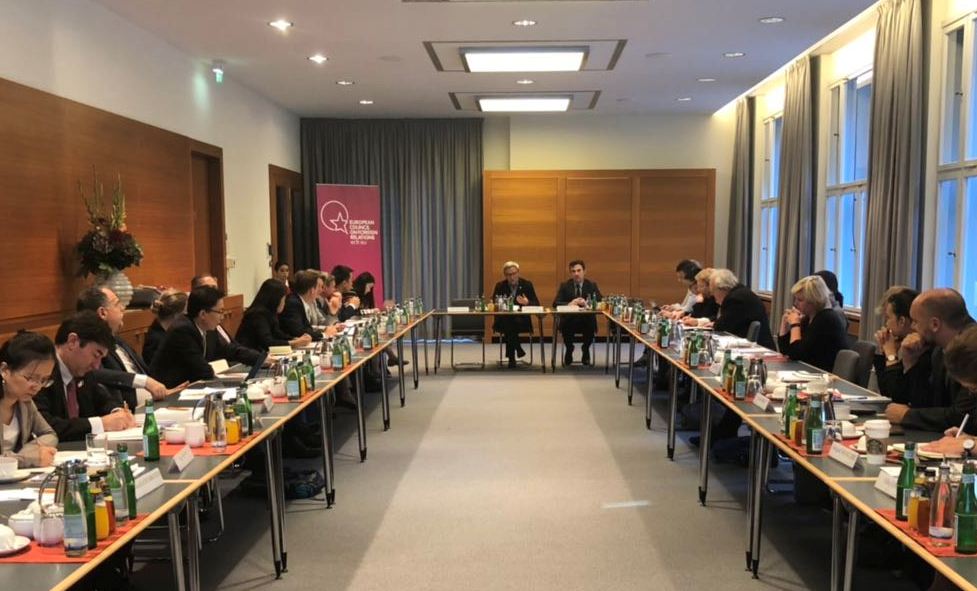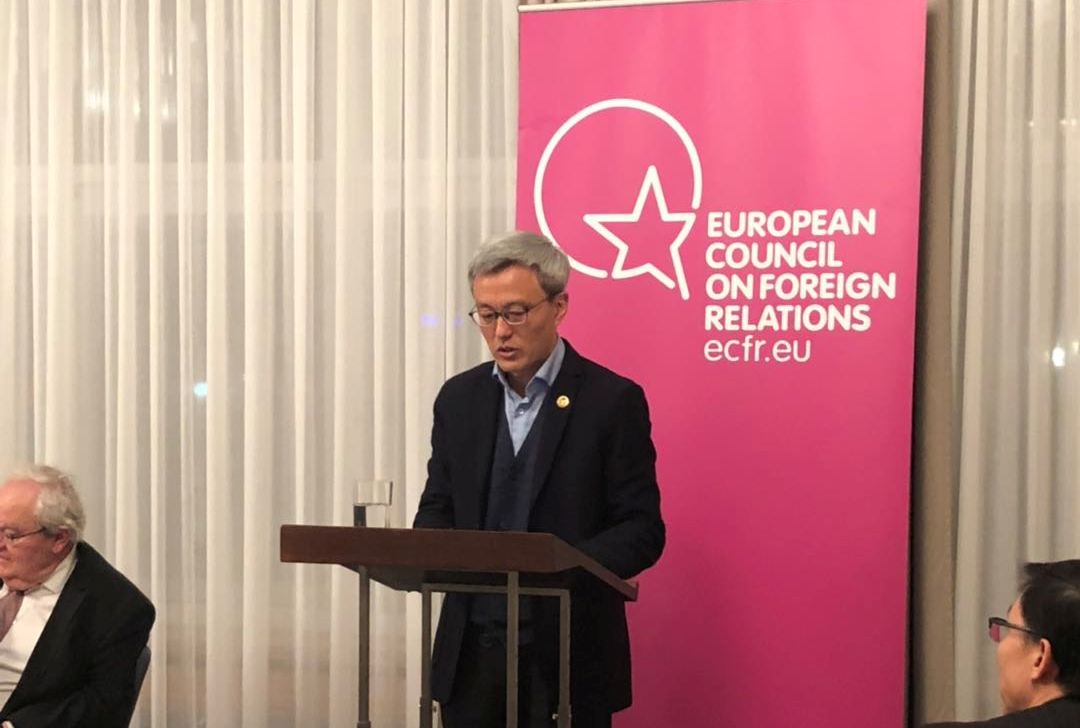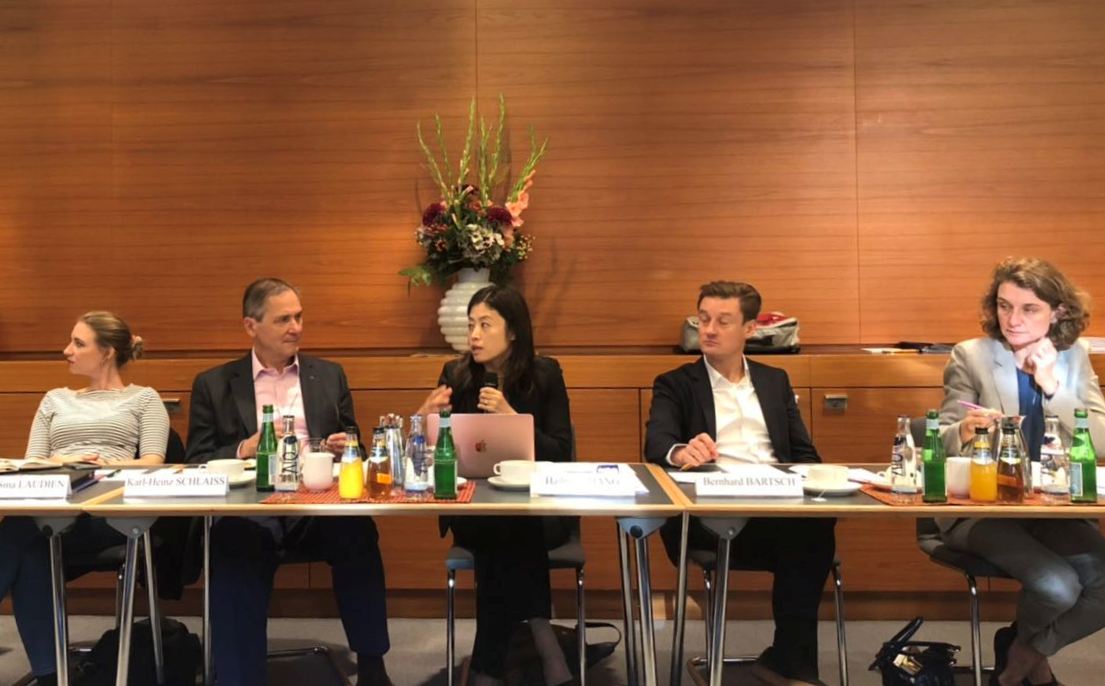On October 11-12, 2018, SIIS co-hosted European China Forum with European Council on Foreign Relations in Berlin. This forum aimed to discuss the international order and trends in global governance as well as Transatlantic-China-Russia relations, China and the EU’s role in global trading relations and in the era of new technologies and digitalization. Almost 30 scholars and governmental officials attended the forum and shared their insights.

SIIS president Chen Dongxiao delivered a keynote speech on “the EU and China should Step up our Joint Efforts for the New Consensus”. Dr. Zhang Haibing, SIIS assistant president also participated in discussion.


Prof. Chen Dongxiao’s keynote speech is as follows:
The EU and China should Step up Joint Efforts for the New Consensus
My colleagues and I are very glad and honored to be here to join our European colleagues attending the 6th European China Forum.
The year of 2018 is very unique for world politics. It is the 100th anniversary of end of WWI, the 10th anniversary of breaking out of financial meltdown and global economic crisis. It is also the 40th anniversary of China's launching of reform and open-up. So time just could not be better for all of us present at the forum to do review and preview, and compare notes with each other on HOW to appreciate the unfolding transformation in today's world politics and WHAT the implicationsare for the trajectory of the EU-China relationship in the future.
My general judgement is that the world politics has entered a new historical cycle of greater instability and uncertainty, so that it is even more imperative than before for the stakeholders of international community, including the EU and China, to build up new consensus in order to navigate the uncharted water. Instability and uncertainty have found many of their expressions. But three of them are most visible and disruptive today.
First, strategic instability among major powers is growing.Among them geopolitical competitions between the United States on the one hand, and China and Russia on the other have further deepened. On October 4th, U.S. Vice President Mr. Pence delivered a 40-minute speech broadside against China, reminiscent of the strong streaks of “Evil Empire” rhetoric against former Soviet Union made by the late U.S. President Reagan almost forty years ago.
Many Chinese people including myself are less shocked than confused, and deeply worried. We ask ourselves, “Is Washington formally announcing a 'Cold War II' with China? Whether the EU, the long-term American ally would jump on the bandwagon of upcoming 'Cold War II' with the U.S? "
In addition to the rise of strategic tensions between Washington and Beijing and Moscow, transatlantic disputes are also on the rise on some important international issues, such as Iran nuclear deal.
Second, efforts to improve global governance institutions through multilateralism based upon good-faith and equal-footing are heading nowhere.
Since the beginning of this year, all eyes are on the escalating trade disputes between the U.S. and many of its key trade partners, including the EU and China. President Trump and his administration, following the so-called “America First” doctrine, obviously never hesitate to apply unilateralism, including imposing tariffs to maximize America's interests without worrying too much about its disruptive impact on the stability of international trade regime and global supply chain.
Along with on-going and escalating trade conflicts between the U.S. and China, the integrity of the open, rules-based, and multilateral international trade order is also approaching to the “make and break” point.
Besides the international trade system, the global climate regime is also under strain after the Trump administration pulled the United States out of the Paris Accord.
Third, identity politics has made a strong comeback in world politics. In many developed countries as well as many developing ones, the resurgence of populism, protectionism, and nativism is impacting government policy making. As some commentators have observed, the rising of identity politics in many developed world has evolved into a new format of tribalism, further deepening the concerns of social fragmentation and political polarization, thus exacerbating “us” vs. “them” division in world politics.
Adding up all these bad news, we can't help but to ask:“Is today's world inevitably heading toward great divergence? What should be the right way to address the dynamic of the tension between convergence and divergence? What kind of concerted effort for the stakeholders of international community can make to ease the tension? "
There is no easy answer or simple solution. But the sense of urgency is desperately needed for all stakeholders of international community, the EU and China in particular, to work together to mitigate the tension through new consensus building and common interests converging. I have three points to make.
First and foremost, we need to intensify our joint efforts to resist the temptation of conjuring up the devil of Cold War out of historical relics.
The Cold War broke out almost 70 years ago. The year of 2018 is also the 100th anniversary of World War I. Historians as well as scholars of international relations have already summarized numerous lessons on how big powers slid into confrontation by number of strategic mistakes, including miscalculating each others' strategic intentions; mismanaging the security dilemma; misunderstanding the devastating effect of self-fulfilling prophesy triggered by “enemy image making”; and self-indulgence in the memory of triumph over winning the Cold War.
The questions are: Are we capable of learning those historical lessons of the past? Can we take up the responsibility to avoid the trap of Cold War temptation as well as big power confrontation?
My second point is, we should step up our efforts to contain the wave of unilateralism and to cooperate further to overcome the challenges of multilateralism for better global governance.
In the current context, dissatisfaction with globalization has been on the rise visibly, so has been the frustration with multilateralism and global governance. How to strike a delicate and more sustainable balance among the national sovereignty, domestic decision making and global governance is a great challenge for globalization.
However, unilateralism does not bode well for this hyper-connected and interdependent world faced with an increasing number of global problems. Despite of its obvious appealing, unilateralism could only generate more problems than the solutions it tries to seek.
Global problems demand global solutions, cooperative responses and collective commitments. Both the EU and China need to tap the potential of improving multilateral mechanisms, such as G20, for starting dialogues to seek new consensus so to allow more members to take on a shared agenda with focus on trade, climate change, inequality, and technological change, etc.
Last but not least, despite of popular narratives power politics and identity politics, we need to develop a new kind of narrative to address and frame the underlying dynamic of today's world.
From a macro perspective, the new modernization in the non-West world coincides with the West world's rebalancing of post-modern trend. China plays the central part in the former process while the EU as whole represents a significant part in the latter one.
A grand modernization process has swept across the non-West world since the end of the Cold War. And by the end of the second decade of the new century, the vast developing world, including the most populous China and India, and Southeast Asia, Latin American, and Africa, have largely completed the preliminary phase of modernization, that is, a transition from low-income to mid-income countries. According to World Bank's report, of the World Bank Group's 189 member countries, 40 minus are advanced economies, among the rest of 150 developing counties, 108 countries have moved into mid-income status, the so called MICs countries, with the combined populations of more than 5.5 billion people and accounting for about one-third of global GDP. About 40 of them are upper-middle income countries.
Today, an increasing number of developing countries are now marching toward a more-advanced development phase. This process will be unprecedented as its benefits will reach vast populations and territories in human history, but at the same time, challenges along the journey, either domestic or international, will be as many as they will be serious.
Whether this more-advanced phase of modernization can be achieved without major upheavals is the developing world's common challenge. From a domestic perspective, major issues include governance capacity building, upgrading of economic, political, and social structures. At the external level, it mainly depends on whether the West-dominated international system can accommodate the collective rise of non-West countries.
For the West world and numerous developed countries, their post-modern trend since the end of Cold War has also entered what I called a “rebalancing period”.
In the developed countries, the glaring division between open and competitive globalism/elitism and protective and equality-focused nativism and populism is driving further apart the beneficiaries and victims of globalization, creating a new fault line in the global political and economic landscape. The United States itself is involved in this process whose political and economic weight and strategic choices may tilt the overall balance either way. As for the rest of the world, the West as a whole is also facing greater pressures for internal transformation. Therefore, the Western world as a whole desperately needs new political, economic and social equilibrium so that the increasingly fierce tension could be reconciled between nativism and populism as manifested in Brexit and Trump's election on the one hand, and globalism and elitism on the other.
When modernization of the non-West world encounters postmodern transformation of the West world, the mode of their interplay, whether in an inclusive, stable, and collaborative way, or in an exclusionary, confrontational, and chaotic fashion, will exert a huge and lasting impact on the future course of world politics.
In other words, the uncertainty of great convergence or great divergence of the world in the future will largely depend upon how post-modern values in developed countries blend or clash with the modern values of the developing countries. Therefore, both the EU and China should cherish the sense of urgency in order to work out a shared agenda of cooperation as soon as possible. The stake is just too high for both the EU and China, whether due to our inaction or our irresponsible actions.
With that, I will stop and thanks for your attention.
